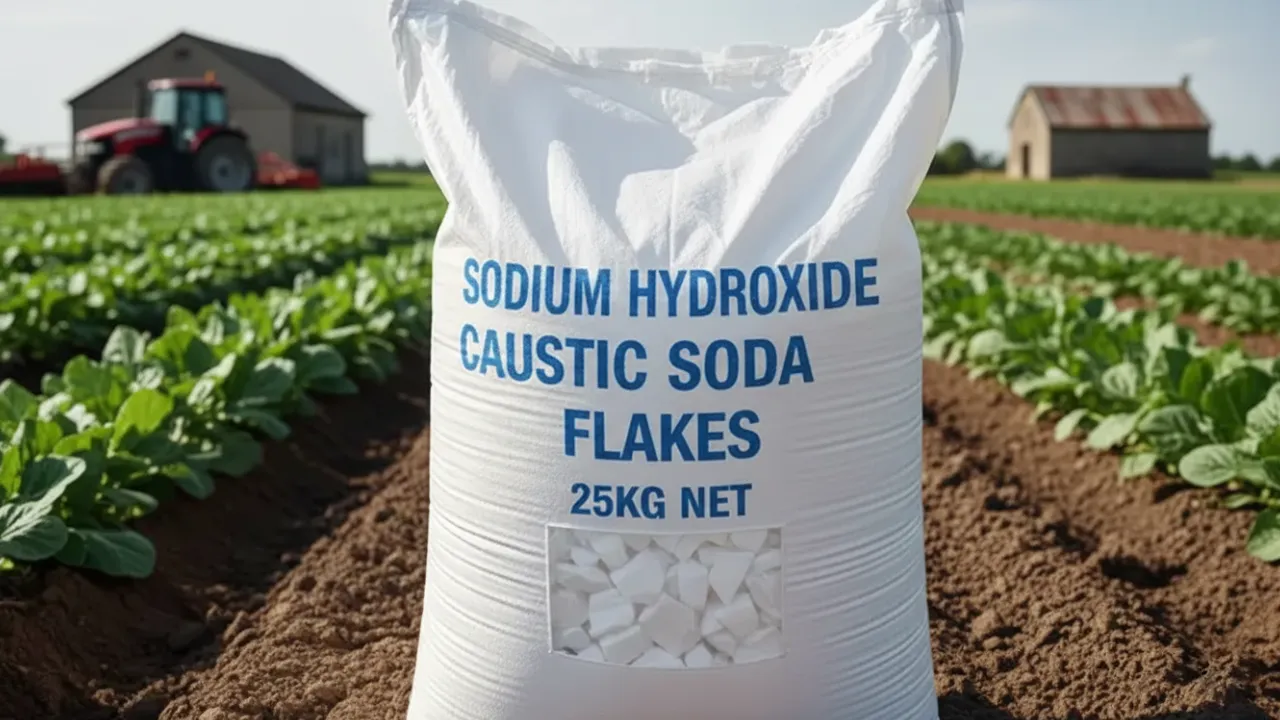Caustic Soda Uses in Agriculture

Introduction
Caustic soda, chemically known as sodium hydroxide (NaOH), is a highly versatile and essential chemical in modern agriculture. Its strong alkaline nature makes it indispensable for a wide range of agricultural processes, from soil treatment and fertilizer production to crop protection and equipment sanitization. With its ability to neutralize acidic soils, enhance nutrient availability, and improve crop yields, caustic soda is a critical component of modern farming practices.
High-quality caustic soda is available in flakes and pellets, allowing farmers and agribusinesses to select the most suitable form for their specific needs. Sourcing from a trusted caustic soda supplier ensures consistent product quality, safe handling, and efficient delivery.
What is Caustic Soda?
Caustic soda is a strong, highly alkaline compound with high solubility in water. Its alkalinity makes it ideal for neutralizing acids, enhancing soil fertility, and improving crop performance.
Key Properties of Sodium Hydroxide in Agriculture:
-
Strong alkalinity for neutralizing acids
-
High solubility in water for easy application
-
Corrosive nature, requiring careful handling
-
Long shelf-life when stored properly
Types and Grades of Caustic Soda for Agriculture
-
Caustic Soda Flakes – Solid form, easy to store and handle in bulk, dissolves quickly in water, and is suitable for soil treatment and fertilizer preparation.
-
Caustic Soda Pellets/Prills – Uniform small pellets ideal for mechanized fertilizer blending and controlled pH adjustment in agricultural applications.
Applications and Uses of Caustic Soda in Agriculture
1. Soil pH Adjustment
Acidic soils limit nutrient availability and hinder crop growth. Caustic soda flakes or pellets are used in controlled amounts to raise soil pH, improving nutrient absorption, root development, and overall crop productivity. This precise control is particularly important for high-value crops sensitive to soil acidity.
2. Fertilizer Production
Caustic soda is essential in the production of sodium-based fertilizers, including sodium nitrate and compound fertilizers. Its alkaline properties enhance nutrient solubility and availability, ensuring fertilizers release nutrients effectively into the soil.
3. Pest and Pathogen Control
Diluted solutions of caustic soda are used to control fungal and bacterial contamination in soils and storage areas. By maintaining a controlled alkaline environment it reduces crop disease risks and promotes healthier, more resilient plants.
4. Equipment Cleaning and Sanitization
Agricultural machinery, storage tanks, and pipelines often accumulate organic residues and microbial contaminants. Caustic soda flakes or pellets, dissolved in water, are highly effective for cleaning and disinfecting such equipment, preventing contamination during crop processing and maintaining hygiene standards.
5. Post-Harvest Crop Processing
Caustic soda is widely used in the processing of food crops, including:
-
Peeling and cleaning fruits and vegetables
-
Processing sugarcane juice
-
Clarifying juices and syrups
These applications help ensure higher-quality processed products with extended shelf life.
6. Crop Residue Management
Caustic soda helps in breaking down crop residues, making them easier to compost or return to the soil. This improves soil structure, increases organic matter, and enhances nutrient content for subsequent crops.
Handling and Storage of Caustic Soda
-
Storage Conditions: Keep in a cool, dry, and well-ventilated area, away from acids and moisture.
-
Container Requirements: Use corrosion-resistant containers for flakes and pellets.
-
Safety Measures: Display hazard signs and limit access to trained personnel only.
-
Spill Management: Equip storage areas with neutralization materials and containment procedures.
Safety Tips
Caustic soda is highly corrosive and requires careful handling:
-
Always wear PPE: gloves, goggles, protective clothing, and boots.
-
Avoid direct contact with skin and eyes; rinse immediately with water if exposed.
-
Never mix with acids or incompatible chemicals.
-
Keep children and untrained personnel away from storage and handling areas.
-
Store securely to prevent accidental ingestion or environmental contamination.
Packaging and Transportation
Caustic soda for agricultural use is packaged to ensure safe handling and delivery:
-
Flakes: 25–50 kg moisture-proof bags or bulk containers
-
Pellets/Prills: Bulk bags or containers for mechanized fertilizer blending
-
Container Loading: 20–40 ft containers, depending on form and quantity, suitable for international transport
Conclusion
Caustic soda is a vital agricultural chemical that improves soil quality, supports fertilizer production, protects crops, and maintains equipment hygiene. Using high-quality flakes or pellets from a trusted supplier ensures maximum efficiency, safety, and sustainable agricultural practices.

